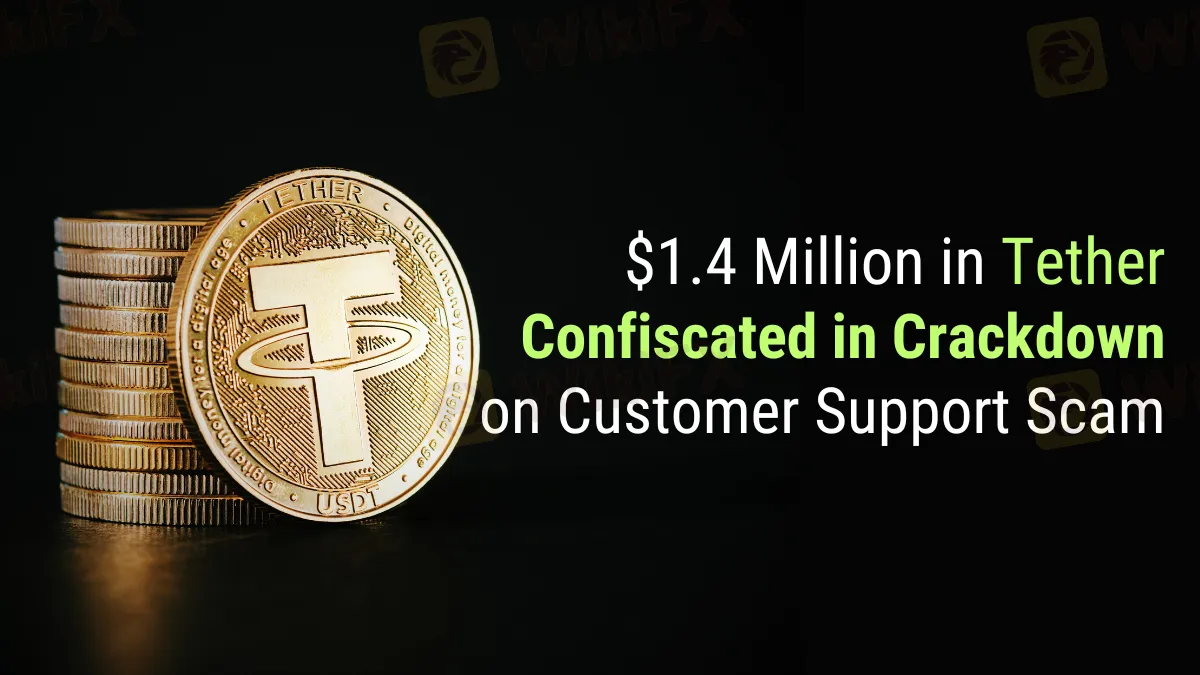简体中文
繁體中文
English
Pусский
日本語
ภาษาไทย
Tiếng Việt
Bahasa Indonesia
Español
हिन्दी
Filippiiniläinen
Français
Deutsch
Português
Türkçe
한국어
العربية
$1.4 Million in Tether Confiscated in Crackdown on Customer Support Scam
Abstract:US Attorney's Office seizes $1.4M in Tether from scam, exposing tactics targeting vulnerable populations. Implications for crypto regulations & DeFi.

In an enormous attempt to stop fraudulent activities, the United States Attorney's Office in Chicago, Illinois, has taken down a customer service scam business and seized about $1.4 million in Tether (USDT). This operation highlights the evolving tactics used by fraudsters in the Internet age, namely targeting the elderly and other vulnerable populations.
Tether, the DOJ, and the FBI were in charge of organizing the theft on March 12. Scam pop-ups said that the victims' computers had taken over as a component of a larger scheme. They informed the victims that their bank accounts were at risk when they called the fictitious customer service number. Following their deception of the victims into thinking USDT would safeguard their property, the scammers asserted their ownership of the tokens.
An uncommon accomplishment in the battle against digital fraud is the successful recovery of USDT from an unhosted digital currency wallet, which sets this instance apart. A January 24 document reveals that the money seized was painstakingly traced to five separate wallets linked to a wire fraud scheme, even if the precise details of the recovery procedure are still unclear. Money laundering may have occurred because intermediate addresses transmitted small amounts of money.
Despite conducting a significant portion of its activities in foreign countries, Tether remains subject to regulatory oversight by the Office of Foreign Assets Control (OFAC) of the United States. The recent sanctioning of Tether's association with Tornado Cash, an Ethereum network coin mixer, by OFAC, underscores the need for international collaboration in the battle against money laundering in the cryptocurrency business.
Future stablecoin rules will provide Tether with significant challenges in the long term. According to recommendations made by organizations like JPMorgan Chase, the government may ultimately favor stablecoins that adhere to AML and Know Your Customer (KYC) regulations. These restrictions are becoming more open. The decentralized finance (DeFi) sector could potentially experience substantial transformations in light of these legal developments, considering the USDT's significance as a collateral and liquidity resource. Ensuring the protection of consumers against fraudulent activities continues to be a principal consideration as the digital banking industry progresses.

Disclaimer:
The views in this article only represent the author's personal views, and do not constitute investment advice on this platform. This platform does not guarantee the accuracy, completeness and timeliness of the information in the article, and will not be liable for any loss caused by the use of or reliance on the information in the article.
Read more

MultiBank Group Wins Big at Traders Fair Hong Kong 2024
Discover how MultiBank Group, a global leader in financial derivatives, secured three prestigious awards at Traders Fair Hong Kong 2024, highlighting its innovative trading solutions and industry excellence.

CySEC Settles Compliance Case with Fxview Operator Charlgate Ltd
Discover how CySEC resolved compliance issues with Charlgate Ltd, the operator of Fxview, through a €50,000 settlement. Explore the investigation, regulatory measures, and CySEC's new website designed for improved accessibility and transparency.

TradingView Launches Liquidity Analysis Tool DEX Screener
Discover TradingView's DEX Screener, a powerful tool for analyzing decentralized exchange trading pairs. Access metrics like liquidity, trading volume, and FDV to make smarter, data-driven trading decisions.

Doo Financial Expands Reach with Indonesian Regulatory Licenses
PT. Doo Financial Futures, a subsidiary of the global financial services brand Doo Group, has secured regulatory approval from Indonesia’s Badan Pengawas Perdagangan Berjangka Komoditi (BAPPEBTI).
WikiFX Broker
Latest News
Geopolitical Events: What They Are & Their Impact?
Volkswagen agrees deal to avoid Germany plant closures
Top 10 Trading Indicators Every Forex Trader Should Know
TradingView Launches Liquidity Analysis Tool DEX Screener
MultiBank Group Wins Big at Traders Fair Hong Kong 2024
WikiEXPO Global Expert Interview: Simone Martin—— Exploring Financial Regulation Change
'Young investors make investment decisions impulsively to keep up with current trends' FCA Reveals
Why Do You Feel Scared During Trade Execution?
CySEC Settles Compliance Case with Fxview Operator Charlgate Ltd
Malaysian Influencer Detained in Taiwan Over Alleged Role in Fraud Scheme
Currency Calculator


